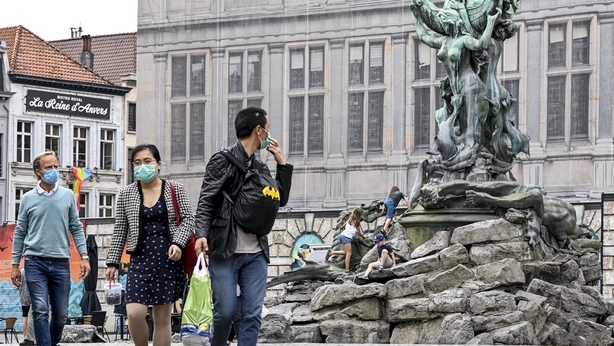Negligence is behind Germany's steady rise in new coronavirus infections, the head of the Robert Koch Institute said, adding it was unclear if a second wave was under way.
"The new developments in Germany make me very worried," Lothar Wieler, of the RKI, said during his first news conference in weeks.
"The rise has to do with the fact that we have become negligent," he added, urging people not to flout social distancing rules.
The number of daily new cases almost doubled today to 633, and the RKI, which is Germany's most closely followed compiler of Covid-19 data, linked that to increased contact at parties and the workplace.
With 206,000 confirmed cases and just over 9,000 deaths, Germany wants to avoid a second wave, which would bring back lockdowns after economically crippling restrictions that closed many businesses for six weeks in March and April.
Europe's biggest economy withstood the pandemic with far fewer deaths than some large neighbours such as France and Italy, owing to widespread testing, a well-equipped healthcare system and good adherence to social distancing.
The summer holiday season has prompted fears that tourists returning from destinations experiencing a surge in new cases like Spain could sow the seeds of a second wave.
But Dr Wieler downplayed that.
"It is irrelevant if you are on holiday or at home," he said. "The holiday is as much a part of the precautions against the spread of Covid-19 as your work and home life. The setting is irrelevant."
Germany has advised holidaymakers not to travel to several Spanish regions, including Catalonia, home to Barcelona.
The port city of Hamburg is weighing a ban on selling alcohol in its red light district after revellers ignored social distancing rules at the weekend.
The RKI also said face coverings should be worn not only indoors, but outdoors too if social distancing cannot be maintained.
Dr Wieler said basic hygiene rules such as hand washing and distancing must be followed to keep infections down, and "if one can't ensure 1.5 metres distancing, then we recommend masks - not just in closed areas but also in the open".
Germany will make coronavirus tests mandatory for travellers returning from risk areas, Health Minister Jens Spahn said.
"We must prevent returning travellers from infecting others unnoticed and thus triggering new chains of infection," he wrote on Twitter.
The call follows warnings from France against travel to Catalonia and the UK's decision to quarantine anyone arriving from Spain for 14 days.
New restrictions introduced
Belgium has announced that from tomorrow, people there would be allowed to see five people at most outside their family circle, reducing the permitted "social bubble" from 15.
The measures came after the country recorded 1,952 new cases over the past week, more than 70% up on the previous week.

Belgium's second city Antwerp also announced a nighttime curfew.
In the city, a major business hub and sea port, bars and restaurants will close at 11pm and citizens will be obliged to get home by 11.30pm and to stay there until 6am (local time).
Everyone over 12 years old will have to wear a face mask in public places and crowded areas, contact and adult team sports will be banned and teleworking will be compulsory for anyone whose employment allows it.
Antwerp governor Cathy Berx said in a statement that the situation in her city was such that she had decided to supplement the measures already taken on a national level.
France ordered night-time curfews for beaches in the Brittany resort of Quiberon on the Atlantic coast, after a fast-spreading Covid-19 cluster emerged there last week.
World a 'long, long way from the end' - Nabarro
Meanwhile, the World Health Organization's Special Envoy for Covid-19 has said the number of people infected with the virus continues to rise and he is concerned there seems to be a sense that the pandemic is "finished" in Europe.
Dr David Nabarro said the world is "a long, long way away from the end" and people must learn to live with the virus and keep it at bay.
He said social distancing, mask wearing and hand hygiene must play a part of everyday life for the foreseeable future.
Speaking on RTÉ's Morning Ireland, Dr Nabarro said he wished that people had taken the virus seriously six months ago and that the world had recognised that this is what everybody has to do.
He said there will be spikes of the virus but recognising those spikes is a sign of good practice, not failure.
Dr Nabarro said there are candidate vaccines all over the world and it is wonderful to see the huge amount of scientific work being done, but could not say when one will be available.
He said testing takes time and he estimated it would be two-and-a-half years before a vaccine could be ready for mass production and distribution.
Greece makes masks compulsory at more indoor public spaces
Greece will make mask-wearing compulsory at more indoor public spaces to contain the spread of the novel coronavirus after a small flare up of Covid-19 infections in the second half of this month, its Deputy Civil Protection Minister said.
Health authorities had made mask-wearing compulsory for consumers at supermarkets ten days ago. Mask have been also compulsory at public transport.
The measure goes into effect from tomorrow.
Greece has managed to contain the spread of Covid-19 infections to 4,227 confirmed cases and 202 deaths after imposing an early lockdown based on official data up yesterday.

